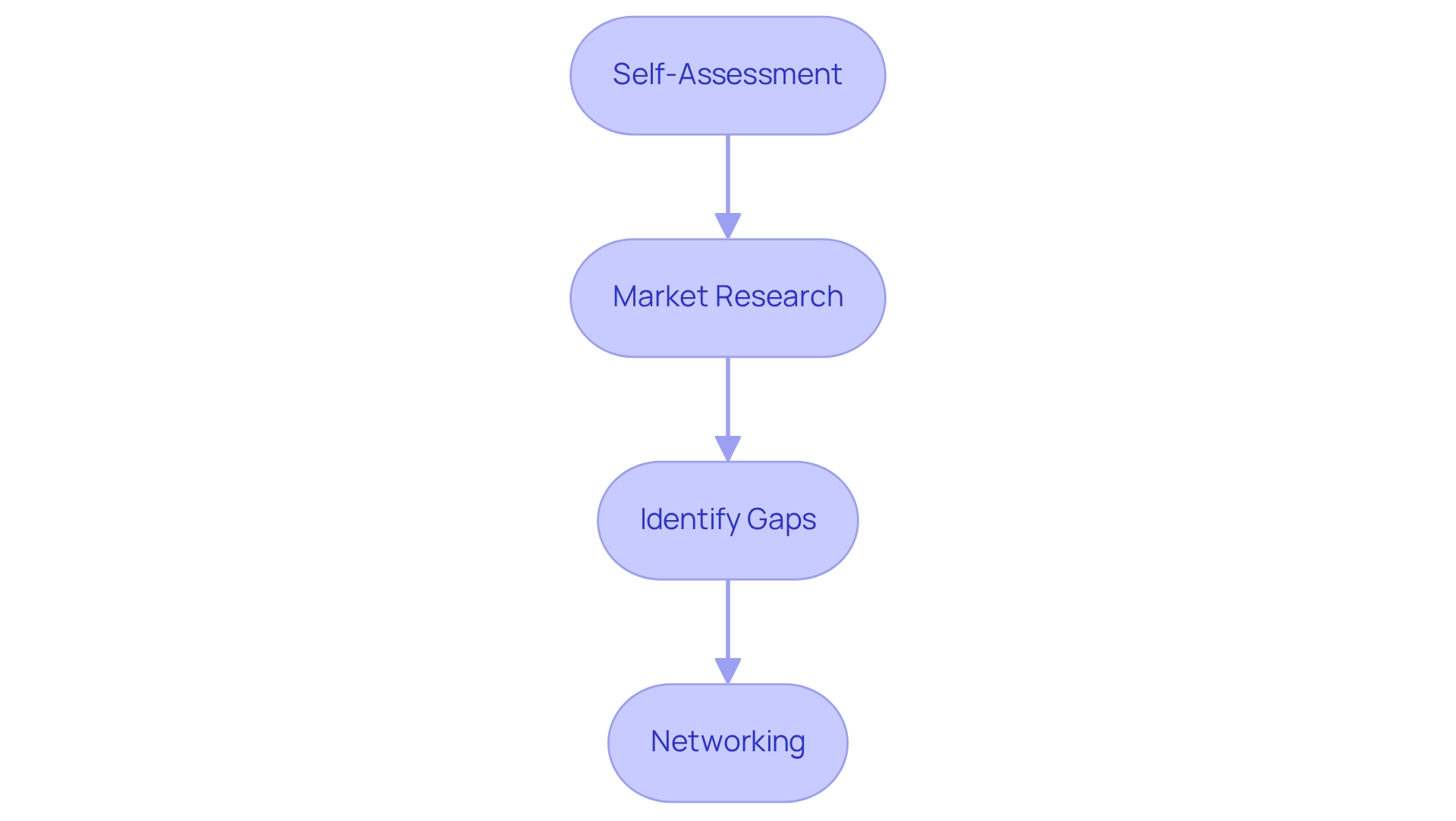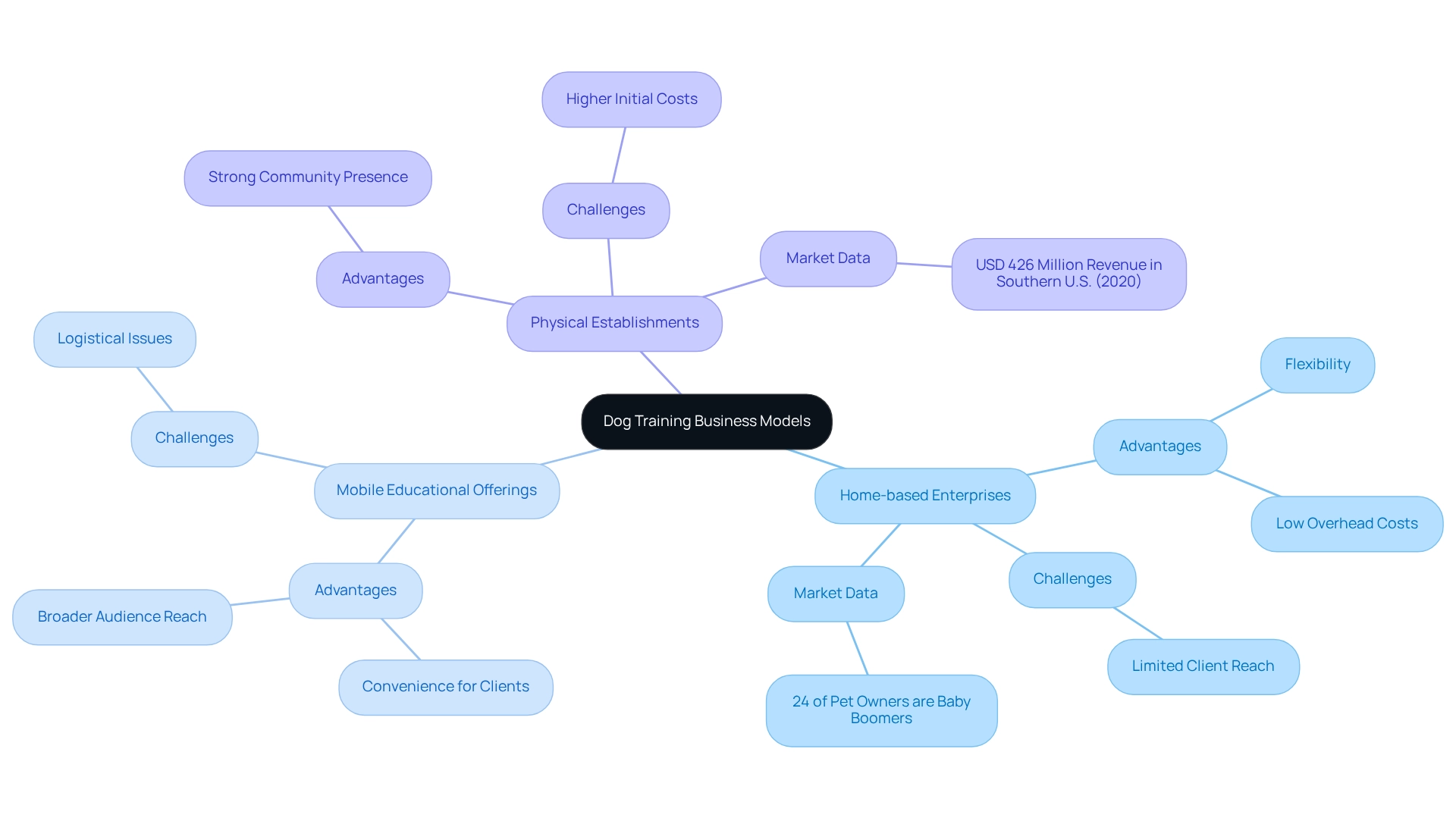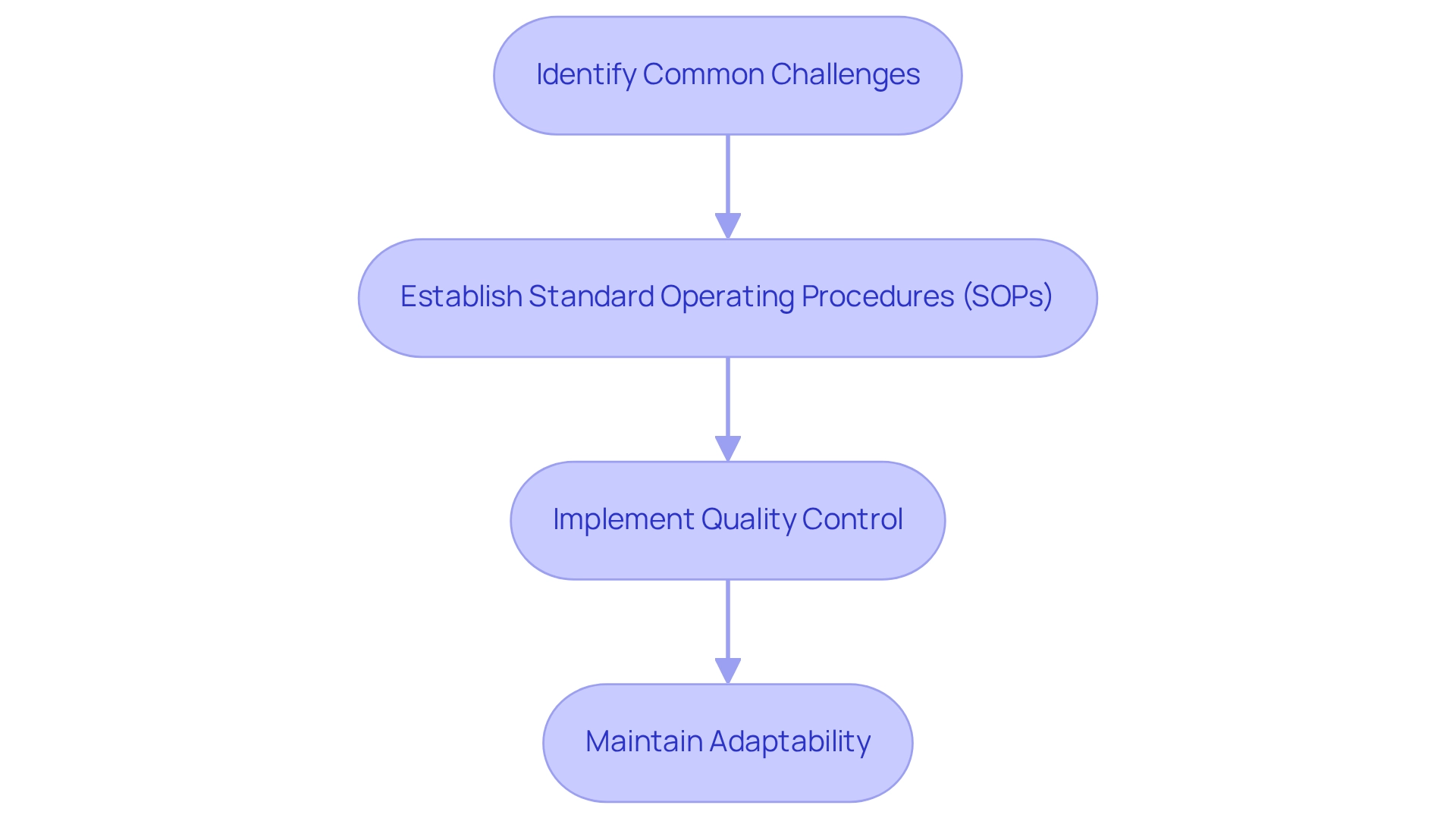Overview
To successfully launch a dog training business, one must first engage in thorough self-assessment. This foundational step is essential for understanding personal capabilities and aligning them with market demands.
Conducting comprehensive market research is equally vital, as it allows aspiring trainers to identify service gaps within the local pet community. Networking within this community not only fosters relationships but also enhances visibility and credibility.
Establishing a strong brand identity and committing to ongoing education are crucial elements that support both the foundation and growth of a dog training business.
These steps collectively empower individuals to navigate the competitive landscape effectively, ensuring a robust start and sustainable success.
Introduction
In the dynamic realm of dog training, aspiring entrepreneurs encounter a remarkable opportunity to transform their passion for pets into a flourishing business. With dog ownership steadily increasing and a rising demand for professional training services, the market is primed for those prepared to dedicate their time and energy. This article explores the critical steps necessary for launching a successful dog training business, particularly within the framework of a franchise such as Tip Top K9.
- Evaluating personal readiness
- Conducting thorough market research
- Selecting the appropriate business model
- Participating in comprehensive training
Each stage is vital for establishing a robust foundation. Furthermore, effective marketing strategies and the capability to navigate industry challenges will be instrumental in securing long-term success. For those poised to embark on this rewarding journey, the insights presented here will serve as an invaluable guide to making a significant impact in the lives of dogs and their owners.
Assess Your Readiness and Market Demand
-
Self-Assessment: Begin by evaluating your skills and enthusiasm for launching a dog training business. Assess your background with canines, any formal training you may have, and your ability to engage effectively with clients. Reflecting on how to start a dog training business is crucial, as it requires dedication and resilience. Successful dog trainers typically possess a blend of skills and a genuine passion for animals, which significantly enhances their effectiveness. As a franchise owner with Tip Top K9, you will have the opportunity to work with dogs daily while creating a fulfilling career that aligns with your passion.
-
Market Research: Conduct thorough market analysis to understand how to start a dog training business by evaluating the demand for dog education options in your area. In 2025, the dog ownership rate in the U.S. is projected to remain high, with over 44% of households owning at least one dog. This statistic underscores the ongoing need for canine education. To grasp how to start a dog training business, investigate local competitors and potential client demographics. Utilize online surveys or community forums to gather insights from dog owners regarding their educational needs, which can assist in tailoring your offerings to meet market demands. As Ingrid Chu notes, “Gen Z is driving a remarkable shift in pet ownership,” highlighting the importance of understanding demographic trends for success in this market. Furthermore, the pet industry is expected to grow significantly, with Morgan Stanley forecasting an 8% annual growth, making this an opportune time to enter the field.
-
Identify Gaps: Analyze the current dog education offerings in your area. Identify gaps in the market where you can introduce unique services or specialties, such as obedience training, behavioral modification, or specialized puppy instruction classes. This strategic positioning can set your business apart in a competitive landscape, particularly as Millennials and Gen Z increasingly focus on how to start a dog training business alongside pet ownership. The case study titled “The Role of Millennials in Pet Ownership” indicates a growing market for pet services, reinforcing the necessity of market research and identifying gaps in available services.
-
Networking: Establish connections with local pet professionals, including veterinarians, groomers, and pet supply stores. Building relationships with these stakeholders can provide valuable insights into the local market and create potential referral opportunities. Networking is essential, as it not only enhances your visibility but also establishes your credibility within the community, which is vital for attracting clients. Engaging with the Tip Top K9 community can also offer support and resources as you embark on your franchise journey.
Choose Your Business Model and Structure
When embarking on the journey to establish a dog training business, particularly as a Tip Top K9 franchise owner, it is crucial to select a model that aligns with your objectives and resources. Your options include:
- Home-based enterprises
- Mobile educational offerings
- Physical establishments
Home-based education stands out for its low overhead costs and flexibility, making it an attractive choice for many aspiring entrepreneurs.
In 2025, data indicates that home-based dog training enterprises are thriving, driven by a significant demand for personalized services. Notably, 24% of pet owners are Baby Boomers, a demographic that often seeks tailored training options for their pets. Mobile educational offerings provide convenience for clients, allowing instructors to reach a broader audience, while physical establishments foster a strong community presence, albeit with higher initial costs.
The southern region of the U.S. generated over USD 426 million in revenue for pet education services in 2020, underscoring the market potential in this sector. Each model presents unique advantages and challenges; therefore, it is essential to consider factors such as your target market, personal preferences, and financial capabilities when learning how to start a dog training business. As a Tip Top K9 franchisee, you will benefit from a robust startup support system designed to ensure your success. Our initial development program is three times longer than those of our competitors, equipping you with the knowledge and skills necessary to excel in the dog training industry.
Importantly, prior dog handling or business experience is not a prerequisite, making this opportunity accessible to aspiring franchise owners from diverse backgrounds. We recognize that many of our franchise owners are first-time entrepreneurs, and we are dedicated to guiding you through the process of selecting the right location based on demographics and metrics. Following the signing of your franchise agreement, you will participate in a series of six theoretical and conceptual Zoom sessions, leading into an intensive six-week program that consists of six days a week, ten hours a day.
This comprehensive development, paired with ongoing support, ensures that you are thoroughly prepared to manage your franchise effectively and achieve enduring success. Our proven system guarantees value and complete customer satisfaction, further enhancing your potential for success in this rewarding industry.
Engage in Comprehensive Training and Support
-
Formal Instruction: Enrolling in a reputable dog education school or certification program is crucial for acquiring foundational knowledge and skills. Seek programs that incorporate diverse teaching methods, behavior modification, and canine psychology. Certifications from recognized organizations not only enhance your credibility but also align with industry standards. Notably, statistics indicate that women instructors are more likely to hold certifications, underscoring a demographic trend that highlights the significance of formal education in the industry.
-
Hands-On Experience: Gaining practical experience is essential for refining your instructional methods and building confidence. Pursue opportunities by volunteering at local shelters, assisting experienced instructors, or offering free coaching sessions to friends and family. A study of dog instruction businesses in British Columbia revealed that 72.24% of those employing reward-based methods were more likely to list credentials, emphasizing the importance of hands-on experience in establishing a successful practice and linking it to effective outcomes.
-
Ongoing Education: The field of dog instruction is continually evolving, making it imperative to stay informed about the latest techniques and industry trends. Attend workshops, seminars, and conferences to enhance your skills. Joining professional associations related to dog education provides access to valuable resources, networking opportunities, and ongoing learning, which are vital for long-term success in this dynamic field.
-
Mentorship: Finding a mentor in the dog behavior field can significantly elevate your professional growth. A mentor can offer guidance, share experiences, and provide constructive feedback on your development techniques. This relationship can help you navigate challenges and refine your methods, ultimately leading to a more rewarding career in canine education. As Abbie D. remarked, “I just have to say that you guys ROCK! I’m so thrilled with the first several video lessons and I already received my books in the mail today! I know I made the right choice and I’m confident that I’m going to get a great education. Thank you for the great service and quality. Here we go!” This testimonial underscores the positive impact of mentorship and quality development programs.
Implement Effective Marketing and Customer Engagement Strategies
-
Brand Development: Establishing a robust brand identity is crucial for understanding how to start a dog training business. Create a memorable business name, logo, and tagline that resonate with your target audience. Consistency across all platforms enhances recognition and builds trust, which is essential for fostering long-lasting customer relationships. As noted by the Dog Trainer Marketing Agency, effective branding not only influences customer decision-making but also positions your offerings as a reliable option in a competitive market. New franchise owners undergo an intensive six-week training program with 10 hours of hands-on training per day, equipping them with the skills necessary to establish a strong brand presence. Additionally, Tip Top K9 provides ongoing support in billing, scheduling, marketing, and business coaching, ensuring that franchise owners can maximize their profitability and thrive in the booming pet industry.
-
Online Presence: A professional website serves as your digital storefront, showcasing your services, customer testimonials, and contact information. Implement search engine optimization (SEO) techniques to enhance visibility in search results, making it easier for prospective customers to find you. Furthermore, consider launching a blog to share valuable insights and tips related to dog education, further establishing your expertise and drawing organic traffic. With the pet industry projected to grow by 134% over the next decade, understanding how to start a dog training business and maintaining a strong online presence is essential for capturing this expanding market.
-
Social Media Marketing: Leverage social media platforms to engage with potential clients and demonstrate your expertise. Share training tips, success stories, and engaging content that resonates with dog owners. Paid social media advertising can significantly enhance your reach by targeting local pet parents and promoting key services. Focus on testing and optimizing ad formats, measuring effectiveness through engagement rates and lead generation metrics to maximize your marketing efforts. The emotional benefits of assisting dogs and their owners present a compelling narrative for those exploring how to start a dog training business, drawing more customers to your services.
-
Customer Engagement: Establishing and sustaining robust connections with customers is essential for long-term success. Implement follow-up communications after educational sessions, offer loyalty programs, and encourage referrals to keep your services top-of-mind. Engaging clients through newsletters or social media not only fosters loyalty but also enhances your brand’s visibility and reputation in the community. The rise of virtual educational options, particularly during the COVID-19 pandemic, underscores the significance of accessibility and customizability in your offerings, presenting substantial revenue opportunities in the evolving pet development landscape. With support from Tip Top K9, franchise owners can concentrate on delivering exceptional service while enjoying the financial benefits of a thriving business.
Navigate Challenges and Ensure Consistency Across Locations
-
Identify Common Challenges: Dog instruction businesses often encounter significant obstacles, notably in customer retention, managing challenging behaviors, and facing competition. In 2025, statistics reveal that nearly 30% of dog instruction businesses struggle with customer loyalty, while 25% face difficulties in effectively addressing behavioral issues. Recognizing the challenges of starting a dog training business is vital for devising proactive strategies that enhance service delivery and customer satisfaction.
-
Establishing standard operating procedures (SOPs) is crucial for ensuring consistency in educational sessions, client interactions, and overall business operations when learning how to start a dog training business. SOPs not only help maintain high instructional standards across various locations but also streamline processes, allowing trainers to deliver efficient services. This structured approach is particularly advantageous in a franchise model, where uniformity in service is essential for brand reputation. Tip Top K9 serves as a prime example of how to start a dog training business, offering an intensive six-week program for new franchise owners that includes 10 hours of practical instruction per day, equipping them with the necessary skills to overcome challenges and thrive in their home-based dog education ventures.
-
Quality Control: Implementing a robust quality control system is imperative for monitoring trainer performance and assessing the effectiveness of training programs. Regular feedback from customers and trainers can pinpoint areas needing improvement, ensuring that high standards are consistently met. In fact, businesses that actively solicit client feedback experience a 20% increase in customer satisfaction, underscoring the significance of ongoing evaluation. The unique value proposition of Tip Top K9, which combines comprehensive instruction with continuous support in a flourishing pet industry, emphasizes the importance of maintaining these elevated standards.
-
Adaptability is essential in comprehending how to start a dog training business, given the ever-evolving nature of the dog education sector. Being receptive to modifying your business model in response to market trends or customer feedback can greatly enhance your competitive advantage. For instance, adopting new developmental methods or expanding service offerings based on client needs can lead to increased client engagement and retention. As Ian Dunbar wisely stated, “Above all, love and understand your dog – they are truly amazing creatures with so much to offer,” highlighting the necessity of understanding dogs in the training process.
Conclusion
Building a successful dog training business, particularly through a franchise like Tip Top K9, begins with a thorough self-assessment and an understanding of market demand. Aspiring entrepreneurs must evaluate their skills and passion while conducting comprehensive market research to identify local opportunities, especially in light of the pet industry’s ongoing growth.
Choosing the right business model—whether home-based, mobile, or brick-and-mortar—is essential. Each model presents distinct advantages, and Tip Top K9 provides extensive support to help franchise owners navigate these critical decisions effectively. Acquiring formal training and hands-on experience will significantly enhance credibility and professional skills.
To attract and retain clients, effective marketing and customer engagement strategies are vital. Establishing a strong brand identity, maintaining an active online presence, and leveraging social media can foster loyalty and encourage referrals, all of which are crucial for long-term success.
Navigating industry challenges necessitates proactive strategies. Implementing standard operating procedures guarantees consistency in service quality, while adaptability to market trends and client feedback bolsters competitiveness.
In summary, the journey toward a thriving dog training business is paved with meticulous planning, unwavering dedication, and a steadfast commitment to excellence. With the right resources and mindset, aspiring entrepreneurs can transform their passion for dogs into a rewarding venture that positively impacts the lives of pets and their owners. Seize this opportunity to make a meaningful difference in the pet training landscape.
Frequently Asked Questions
What is the first step to starting a dog training business?
The first step is self-assessment, where you evaluate your skills, enthusiasm for dog training, background with canines, and ability to engage with clients. Reflecting on your dedication and resilience is crucial, as successful dog trainers typically possess a blend of skills and a genuine passion for animals.
How important is market research when starting a dog training business?
Market research is essential as it helps you understand the demand for dog education options in your area. With a projected high dog ownership rate in 2025, it’s important to investigate local competitors and client demographics to tailor your offerings effectively.
What should I look for when identifying gaps in the dog training market?
You should analyze current dog education offerings in your area to find gaps where you can introduce unique services or specialties, such as obedience training or specialized puppy instruction classes. This strategic positioning can help differentiate your business in a competitive landscape.
Why is networking important in starting a dog training business?
Networking is vital as it helps establish connections with local pet professionals, such as veterinarians and groomers, which can provide valuable insights and referral opportunities. Building relationships enhances your visibility and credibility within the community, attracting more clients.
What types of business models can I choose from when starting a dog training business?
You can choose from home-based enterprises, mobile educational offerings, or physical establishments. Each model has unique advantages and challenges, so it’s important to consider your target market, personal preferences, and financial capabilities.
What support does Tip Top K9 provide to franchise owners?
Tip Top K9 offers a robust startup support system, including a comprehensive initial development program that is three times longer than competitors. This includes theoretical and conceptual Zoom sessions followed by an intensive six-week training program, ensuring you are well-prepared to manage your franchise effectively.
Do I need prior dog handling or business experience to start a franchise with Tip Top K9?
No, prior dog handling or business experience is not a prerequisite. Tip Top K9 is dedicated to guiding aspiring franchise owners through the process, making it accessible to individuals from diverse backgrounds.






